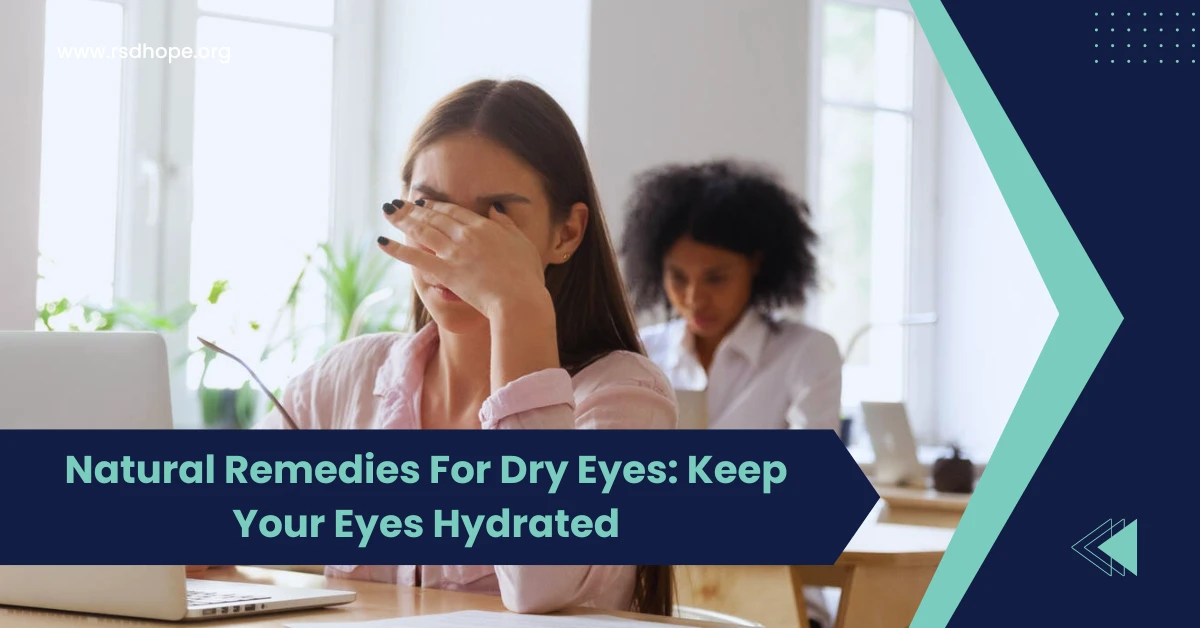Dry eye is a common condition that occurs when your eyes don’t produce enough tears or when the tears evaporate too quickly. Symptoms of dry eye can include discomfort, stinging, burning, redness, and blurred vision. While over-the-counter and prescription treatments are available, many people seek natural remedies for dry eyes to find relief. In this comprehensive guide, we’ll explore various natural remedies and lifestyle changes that can help alleviate dry eye symptoms.
Key Takeaways
- Natural remedies like warm compresses, omega-3 fatty acids, and staying hydrated can help relieve dry eye symptoms.
- Making lifestyle changes, such as taking breaks from screens and maintaining a healthy diet, can reduce dry eye discomfort.
- Consult a healthcare professional if your dry eye symptoms persist or worsen, as medical intervention may be necessary.
Natural Remedies for Dry Eyes
- Warm Compress: Applying a warm compress to your eyes for 5-10 minutes can help stimulate tear production and improve the quality of your tears. The warmth can also soothe the discomfort associated with dry eyes.
- Omega-3 Fatty Acids: Consuming omega-3 fatty acids, found in fish oil and flaxseed oil, can help reduce inflammation and improve the quality of your tears. Incorporate fatty fish like salmon, sardines, and mackerel into your diet, or consider taking a supplement.
- Stay Hydrated: Drinking plenty of water throughout the day can help keep your body and eyes hydrated. Aim for at least 8 glasses of water per day, and avoid excessive consumption of caffeinated or alcoholic beverages, which can dehydrate you.
- Blinking Exercises: Performing blinking exercises can help stimulate tear production and distribute tears evenly across your eyes. Try the 20-20-20 rule: every 20 minutes, look at an object 20 feet away for 20 seconds.
- Humidifier: Using a humidifier in your home or office can help add moisture to the air, reducing the evaporation of tears from your eyes. This is especially helpful in dry or air-conditioned environments.
Also Read: Can Dry Eyes Cause Blindness? Unveiling The Eye Health Connection
Lifestyle Changes for Dry Eye
- Take Breaks from Screens: Prolonged screen time can contribute to dry eye symptoms, as we tend to blink less when focusing on digital devices. Take regular breaks from your computer, phone, or tablet, and practice the 20-20-20 rule mentioned above.
- Protect Your Eyes from Wind and Dust: When outdoors, wear sunglasses or protective eyewear to shield your eyes from wind, dust, and other irritants that can exacerbate dry eye symptoms.
- Avoid Smoke-Filled Environments: Exposure to smoke, whether from cigarettes or other sources, can irritate your eyes and worsen dry eye symptoms. Avoid smoke-filled environments whenever possible.
- Maintain a Healthy Diet: Eating a balanced diet rich in fruits, vegetables, and whole grains can provide your body with the nutrients needed to support eye health. Incorporate foods high in omega-3 fatty acids, vitamin A, and vitamin C to help combat dry eye symptoms.
- Position Your Screen Properly: When using a computer, position your screen slightly below eye level. This can help reduce the amount of eye surface exposed to the air, minimizing tear evaporation.
Treatment for Dry Eye
- Artificial Tears: Over-the-counter artificial tear solutions can help lubricate your eyes and provide temporary relief from dry eye symptoms. Look for preservative-free options if you plan to use them frequently.
- Gels and Ointments: For more severe dry eye cases, your eye doctor may recommend thicker gels or ointments to provide longer-lasting lubrication. These products are often used at bedtime, as they can cause blurred vision.
- Prescription Medications: In some cases, your eye doctor may prescribe medications like cyclosporine or lifitegrast to help increase tear production and reduce inflammation.
- Punctal Plugs: For persistent dry eye, your eye doctor may suggest punctal plugs, which are tiny devices inserted into the tear ducts to prevent tears from draining away too quickly.
When to See a Doctor?
If your dry eye symptoms persist or worsen despite trying natural remedies and lifestyle changes, it’s essential to consult a healthcare professional. Seek medical attention if you experience:
- Severe eye pain or discomfort
- Sudden changes in vision
- Eye redness or swelling
- Sensitivity to light
- Excessive tear production
Regular eye exams are crucial for early detection and management of dry eye, as well as other eye health issues.
Conclusion
Dry eye can be a frustrating and uncomfortable condition, but there are many natural remedies and lifestyle changes that can help alleviate symptoms. By incorporating warm compresses, omega-3 fatty acids, and staying hydrated, you can support your eye health and find relief from dry eye discomfort. Making simple adjustments to your daily habits, such as taking breaks from screens and maintaining a healthy diet, can also make a significant difference.
Remember, if your dry eye symptoms persist or worsen, don’t hesitate to consult a healthcare professional. With the right combination of natural remedies, lifestyle changes, and medical interventions when necessary, you can effectively manage your dry eye and maintain healthy, comfortable vision.
Read More: Why Do My Eyes Burn? Identify The Common Reasons And Find Relief
FAQs
A: While there is no permanent cure for dry eye, symptoms can be managed with various treatments and lifestyle changes.
A: The frequency of artificial tear use depends on the severity of your dry eye. Follow the instructions on the product or consult with your eye doctor for personalized guidance.
A: In most cases, dry eye does not cause permanent vision loss. However, severe or untreated cases can lead to corneal damage, which may impact vision.
A: Omega-3 fatty acid supplements have been shown to help improve dry eye symptoms. Consult with your healthcare provider before starting any new supplement regimen.
References:
- National Eye Institute. (2019). Dry Eye. Retrieved from https://www.nei.nih.gov/learn-about-eye-health/eye-conditions-and-diseases/dry-eye

